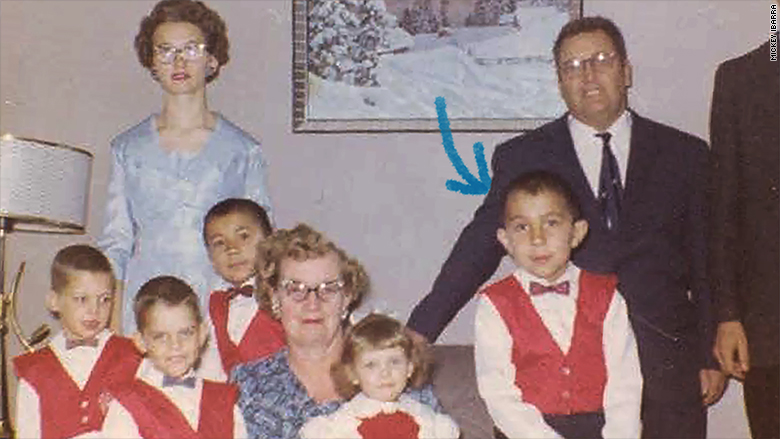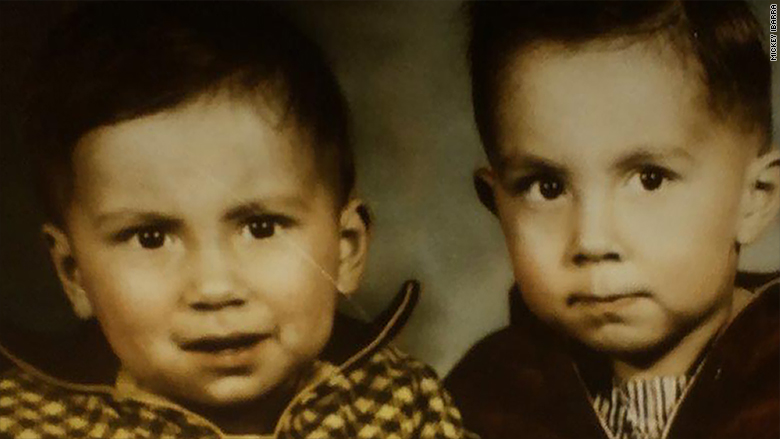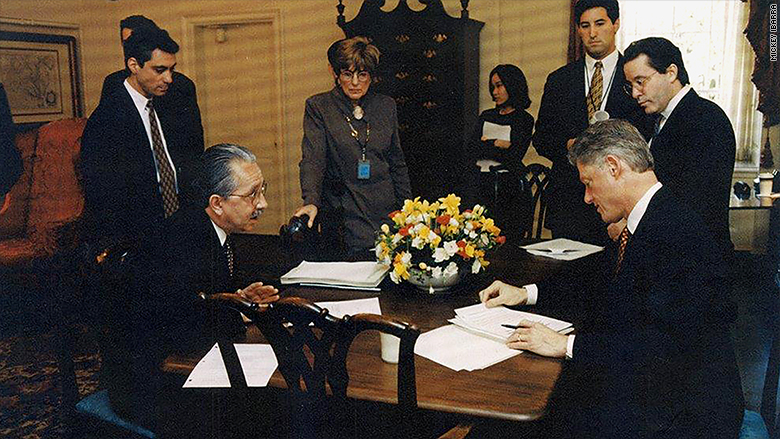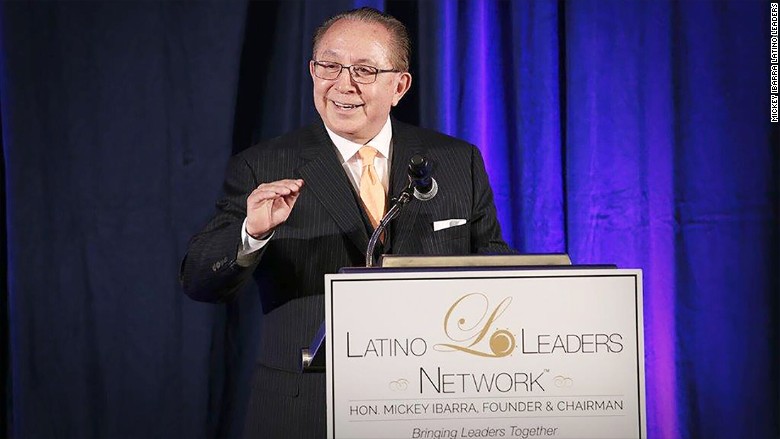
After spending the first 15 years of his life bouncing around in foster care, Mickey Ibarra's life could have taken many wrong turns.
But he considers himself one of the lucky ones.
"We were fortunate that we lived in good foster homes," he recalls.
Those experiences helped pave the way to Brigham Young University and eventually, a four-year stint at the White House as the Director of Intergovernmental Affairs under President Bill Clinton.
"I was with the President to the final hour of the final day and then I opened my business -- and I was scared," Ibarra recalls.
He now owns the Ibarra Strategy Group, a government relations and public affairs firm based in Washington, D.C. His clients include big corporations like Wal-Mart (WMT) and Verizon (VZ), as well as non-profits like the National Education Association (NEA), and the Public Broadcasting System (PBS).
Related: From New Orleans' Ninth Ward to CEO of Carnival Corp.
Ibarra also runs the Latino Leaders Network, a philanthropy that honors individuals who are making a positive impact for Latinos in the United States. Separately, he and his brother David created the Ibarra Foundation Scholarship, which helps Latinos in Utah pay for college.
This is Ibarra's American Success Story:
What was your childhood like?
My father, a Zapotec Indian from Oaxaca, came to pick fruit in Spanish Fork, Utah. He married my mother, a white Mormon girl who was just 16 when I was born. My brother came eleven months later.
Dad was drafted to the Korean War. Back then, you didn't have to be a citizen to be drafted. You just needed to be here.
My parents divorced and my mother was left alone with us. That's when she put us in foster care.
David hated foster care and although we lived together, we had very different experiences.

David, who is much darker than me, was the target of a lot of racism and hate. I take after my mother's features.
There was a point when he wouldn't talk to anyone except for me. I was the talker who was looking out for him. His shyness developed into anger. He was on the wrong path. He would knock the living snot out of someone if he felt insulted.
I was more fortunate. My foster parents enrolled me into Brigham Young High School. So while my brother struggled, I was in a different world -- with all the Mormon leaders' kids.
Related: Nina Vaca: Daughter of immigrants now runs a $650 million firm
What has been your biggest challenge and how did you overcome it?
Unlike my mom, my dad stayed in touch with us periodically.
When I was 15, he sent word that he'd returned from the Army, moved to California and enrolled in the Hollywood Beauty College with the GI bill. He'd opened The Mona Lisa House of Beauty, in Sacramento.
The summer of 1966, our foster parents decided to take a vacation to Southern California and let us stay with our dad for a week.
David connected with him and asked if he could stay there. My dad's response is possibly the most important moment of our life.
He said, "Listen, you guys have never been separated and you won't be separated now. You have to figure it out. If you want to come live with me, you can do that."
David and I knew he wasn't going to make it in Utah. So we decided then and there to stay in Sacramento. It was one of the hardest decisions I've ever made.
But it made all the difference. We developed our Mexican-American identity. We met our relatives and we played football and baseball at a very competitive high school.
Dad was at the salon for 16 hours a day and we were often unsupervised. We had to make sure that we went to school and studied.
I give a lot of credit to my foster family, the Smiths, because they instilled values of honesty and dependability in us.
My dad was a working machine. And that helped a lot, too.

How did you end up working at the White House?
After finishing high school, I enrolled in Brigham Young University.
I didn't do well my freshman year and I ran out of money. In September of 1970, I enlisted in the U.S. Army.
Related: Unlikely recruit becomes top legal adviser in the U.S. Army
Instead of going to Saigon, I was diverted to Frankfurt, Germany. In the Army, I became a man. And with the GI Bill, I re-enrolled in Brigham Young, graduating cum laude in political science.
During senior year, I participated in the school's Washington Seminar Program. I was assigned to the NEA, the largest teachers union. That kicked off my teaching and advocacy career.
I opened an alternative school to teach at-risk students in Spanish Fork, Utah, where my dad had picked fruit.
I became more involved with the NEA. And in 1984, I moved to D.C., eventually becoming the NEA's manager of campaigns and elections, endorsing Bill Clinton in 1992. In 1996, I took a leave of absence to join his re-election campaign.
My leap to the White House didn't happen immediately. After winning, Clinton's chief of staff, Erskine Bowles, offered me a deputy position.
Being raised poor, I was almost frozen for fear of economic instability. I was scared to leave my secure NEA job and jump into a political environment where someone could wake up in a bad mood and you'd be gone.
I said I'd only go as a director and went back to my job at NEA, hoping I didn't damage myself. A few weeks later, I got a call from Sylvia Mathews Burwell, now Health Secretary for President Obama. She said, "Erskine wants you to be Assistant to the President on Intergovernmental Affairs, when can you start?"
On June 6 of 1997 I wandered over to the West Wing, one level below the Oval Office.
Related: Girl Scouts CEO: A small town Arizona girl with big dreams
Do you think you had to work harder than your peers to get ahead?
Yes. I believe I'm a great example of a person born of average ability who through hard work has been able to exceed the average. I'm not going to outthink anybody, but I will outwork just about anybody.

Is there one thing that you do every day that has helped you to become a success?
I smile. It doesn't cost you a thing. Who wants to be around a frowny face?
The business of government is about people. If you don't like people, find yourself another line of work.
And be nice. It's nice to be important, but it's important to be nice.
How do you define success?
Helping others.
I'd like to believe I was a good advocate for my students. At NEA, I'd like to believe I was a good advocate for the teachers. I'd like to believe I was a good advocate to the President, and now I hope I'm a good advocate to my clients.


